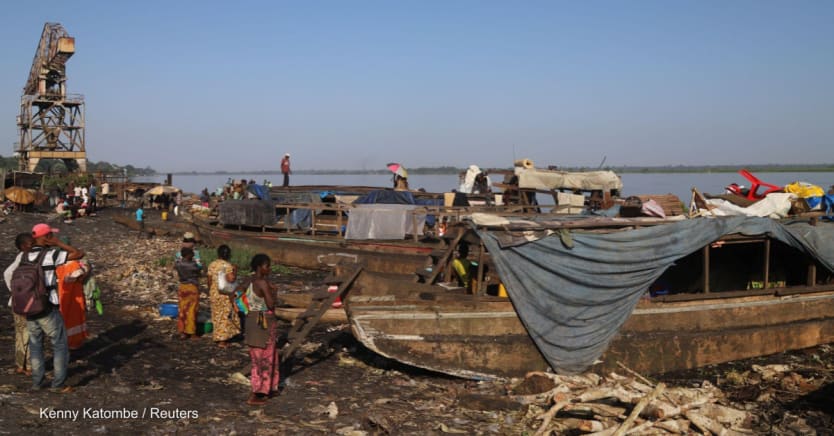
The Democratic Republic of Congo launched an Ebola vaccination campaign Wednesday in Mbandaka, a densely populated port city in the country’s northwest.
Since last week, DRC has reported two Ebola cases among people in the city. They were relatives living in the same home, and both have died.
The must-read weekly newsletter for exclusive global health news and insider insights.
About 200 doses of the rVSV-ZEBOV Ebola vaccine were shipped to Mbandaka from the eastern city of Goma to begin vaccinating contacts of the two people, as well as contacts of those contacts. Health workers and other front-line personnel are also set to be immunized.
Reports of Ebola — a deadly virus that can spread rapidly from person to person through exposure to bodily fluids, even on surfaces — prompt heightened concern in urban areas.
“The disease can be transmitted quickly, and we can report a lot of cases in a short time,” Dr. Mory Keita, the World Health Organization’s incident manager for the Ebola outbreak, told Devex. “We need to control as quickly as possible when it's in an urban area.”
Mbandaka, the capital of Équateur province, is home to more than 1 million people. It sits on the confluence of the Congo and Ruki rivers and is a stopping point for boats en route to the cities of Kisangani and Kinshasa — the national capital — in DRC, as well as the capital city of Brazzaville in the Republic of Congo. The river networks also connect to the Central African Republic. People bustle between rural and urban areas to buy goods and visit relatives, and Mbandaka also hosts an airport.
“Mbandaka is right there on the Congo River. It is very connected to Kinshasa,” said Dr. Mike Ryan, executive director of WHO's Health Emergencies Programme, during a press briefing Tuesday.
DRC has extensive experience responding to Ebola, as does Mbandaka. This is the city’s third outbreak in recent years. In 2020, a cluster of Ebola cases were found in the Mbandaka area but then spread to neighboring communities, resulting in 130 suspected and probable cases and 55 deaths over nearly 6 months. There was also an outbreak in 2018.
“But any outbreak, every outbreak, is unique,” said Dr. Ibrahima Socé Fall, assistant director-general of emergency response at WHO, during the briefing.
DRC has experienced six Ebola outbreaks nationwide since 2018 — representing about 40% of all its outbreaks since the disease was first discovered in the country, then known as Zaire, in 1976. Prior to this month, its most recent Ebola outbreak ended in December in the eastern part of the country.
DRC’s National Institute for Biomedical Research confirmed that an infection in this month’s Mbandaka outbreak was a “spillover event” — meaning that a human contracted the virus from an animal. The virus finds refuge in animal reservoirs in various parts of the country. The disease can be contracted when people come into contact with the “blood, secretions, organs or other bodily fluids of infected animals such as fruit bats, chimpanzees, gorillas, monkeys, forest antelope or porcupines found ill or dead or in the rainforest,” according to WHO.
The institute’s findings indicate that the Mbandaka case was not linked to previous outbreaks. The Ebola virus can linger for prolonged periods in bodily fluids of a small percentage of survivors, sometimes leading to new outbreaks.
“We need to control [Ebola] as quickly as possible when it's in an urban area.”
— Dr. Mory Keita, Ebola outbreak incident manager, World Health OrganizationSpillovers normally happen in rural areas since direct contact with animals is less common in big cities, Keita said. Infections in urban areas usually come from human-to-human interaction.
That means that the two new cases detected in Mbandaka are likely not the first ones in this outbreak. The priority now is to identify the source of the spillover into humans to prevent further infection.
“But this is a very complicated and challenging investigation,” Keita said.
Investigators are mapping out the contacts of the two cases, with over 230 noted so far. Investigations are set to take place at local clinics to identify whether other people have shown symptoms of Ebola. A 20-bed treatment center has also been set up in Mbandaka.
And while responding to an Ebola outbreak in an urban area is hard, rural areas have their own challenges. Many rural areas around Mbandaka don’t have phone networks or actual roads, as people often travel by boat, Keita said.
Beyond vaccines, therapeutics and diagnostics have also been sent to the city.

